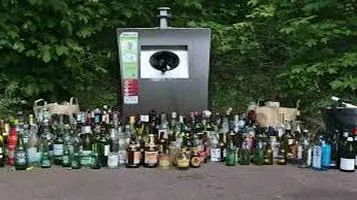Recycled Glass: A Sustainable Marvel in Modern Society
Recycled glass is an environmentally friendly material derived from repurposing used glass products, such as bottles and jars, to create new items. This sustainable process reduces the need for raw materials, conserves energy, and minimizes landfill waste. Glass can be recycled indefinitely without losing its quality or purity, making it a highly sustainable option for various applications, including packaging, construction, and art. The recycling process involves collecting, cleaning, and crushing the glass into small pieces called cullet, which is then melted and molded into new products. By utilizing recycled glass, industries can significantly lower their carbon footprint and contribute to a circular economy, promoting resource efficiency and environmental conservation.

In a world increasingly concerned with sustainability and the environment, recycled glass stands out as a testament to human ingenuity. This material, often overlooked in favor of more glamorous sustainability efforts like solar panels or electric cars, deserves recognition for its significant environmental benefits, aesthetic versatility, and economic potential. Through recycling, glass transforms from discarded waste into a valuable resource, showcasing the circular economy at its finest.
Environmental Impact
One of the most compelling reasons to support the use of recycled glass is its positive environmental impact. Glass is 100% recyclable and can be recycled indefinitely without losing its quality or purity. Unlike other materials that degrade over time, glass can be melted down and reformed repeatedly, making it an ideal candidate for sustainable practices.
The process of recycling glass significantly reduces the need for raw materials. For instance, every ton of recycled glass used in manufacturing saves approximately 1.2 tons of raw materials, including sand, soda ash, and limestone. This reduction in raw material extraction translates to less environmental degradation, lower energy consumption, and reduced carbon emissions. The energy savings are particularly noteworthy; recycling glass uses about 30% less energy than producing new glass from raw materials. This energy efficiency contributes to a smaller carbon footprint, making recycled glass a greener option.
Moreover, recycling glass reduces landfill waste. Glass that ends up in landfills can take thousands of years to decompose, posing long-term environmental challenges. By diverting glass waste from landfills and repurposing it, we mitigate the strain on waste management systems and decrease the environmental hazards associated with landfill sites.
Economic Benefits
The economic benefits of recycled glass are equally compelling. The recycling industry creates jobs, from collection and sorting to processing and manufacturing. These jobs span a range of skill levels, providing employment opportunities in various communities. Additionally, using recycled glass as a raw material can be more cost-effective for manufacturers. The energy savings and reduced need for raw materials can lower production costs, which can be particularly advantageous in industries like construction and packaging.
Recycled glass also has a robust market demand. In the construction industry, for instance, recycled glass is used to manufacture fiberglass insulation, which boasts superior thermal and sound insulation properties. The packaging industry uses recycled glass to produce new containers, reducing the need for virgin materials. Artistic and decorative applications further showcase the versatility of recycled glass. From countertops and tiles to sculptures and jewelry, the aesthetic potential of recycled glass is virtually limitless, providing a unique selling point for products that appeal to eco-conscious consumers.
Aesthetic and Functional Versatility
The aesthetic and functional versatility of recycled glass is another aspect worth celebrating. Architects and designers are increasingly incorporating recycled glass into their projects, drawn by its unique textures, colors, and finishes. Recycled glass countertops, for example, offer a stunning alternative to traditional materials like granite or quartz. These surfaces are not only visually striking but also durable and easy to maintain. The unique patterns and colors of recycled glass can create one-of-a-kind pieces, adding a touch of individuality to any space.
In landscaping, recycled glass is used as an alternative to traditional mulch or gravel. Glass mulch, made from tumbled pieces of recycled glass, is safe to handle and walk on, and it adds a vibrant splash of color to gardens and pathways. This use of recycled glass not only beautifies outdoor spaces but also provides practical benefits like weed suppression and moisture retention.
Functional applications of recycled glass extend to infrastructure projects as well. Ground-up recycled glass, known as "cullet", can be used in road construction as an aggregate in asphalt or concrete. This not only diverts waste from landfills but also enhances the durability and longevity of the roads. The reflective properties of glass cullet can improve visibility and safety on roadways, providing an added functional benefit.
Challenges and Future Prospects
Despite its myriad benefits, the recycled glass industry faces challenges that need addressing. Contamination is a significant issue; mixed or improperly sorted glass can compromise the quality of the recycled product. This necessitates efficient collection and sorting systems to ensure the purity of the glass being recycled. Public awareness and participation are also crucial. Increasing consumer understanding of the importance of recycling glass and the proper methods for doing so can enhance recycling rates and the overall effectiveness of the industry.
Looking to the future, innovations in recycling technology hold promise for overcoming these challenges. Advances in optical sorting technology, for instance, can improve the efficiency and accuracy of glass sorting, reducing contamination and increasing the quality of recycled glass. Continued investment in research and development will be essential to unlocking the full potential of recycled glass.
In conclusion, recycled glass is a shining example of how sustainable practices can benefit the environment, economy, and society. Its endless recyclability, energy efficiency, and versatility make it a valuable resource in our quest for a more sustainable future. By embracing and investing in recycled glass, we not only reduce our environmental footprint but also pave the way for innovative applications and economic opportunities. It is high time we recognize and celebrate the humble yet extraordinary material that is recycled glass.






